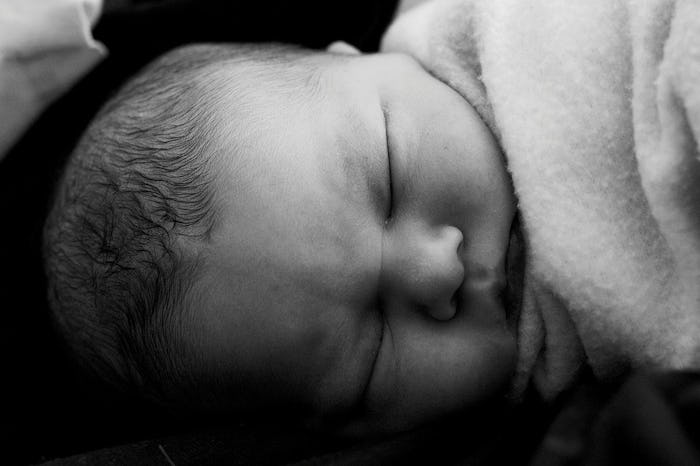Diagnosing your baby's sickness can be a daunting task. Since they're unable to tell you what is wrong, figuring out what is going on in their tiny bodies is often a guessing game that can leave many parents worried. If your baby has been vomiting repeatedly, wondering what is causing their discomfort is probably foremost on your mind. Learning the more common reasons for your baby's projectile vomit can give you a better idea about what the culprit may be and help you resolve the issue as soon as possible.
More often than not, your baby's vomit is a one time issue that probably isn't indicative of anything serious. But in other cases, projectile vomit (especially when it happens frequently,) is a sign of a more serious illness or allergy that may need medical attention. Everything from food allergy to a viral infection can cause vomiting in babies, so narrowing down the symptoms might not seem like an easy task. However, with the help of your doctor if necessary, once you diagnose and treat the issue, your baby's vomiting should subside on its own.
Seeing your baby in pain is devastating, but as soon as you learn the culprit behind their throwing up, whether serious or not, you're one step closer to resolving the issue and giving them relief.
1They Have Gastroenteritis
Gastroenteritis, or more frequently known as the stomach flu, is the most common reason for vomiting in children and babies. According to Baby Center, the stomach flu isn't caused by the influenza virus, but rather rotavirus, adenovirus, calicivirus, and astrovirus.
The most common symptoms of gastroenteritis in babies is diarrhea, vomiting, abdominal pain, fever, chills, and achiness. The aforementioned Baby Center article suggested parents call their pediatrician if they suspect their baby has gastroenteritis.
2They Have A Milk Allergy Or Sensitivity
According to the Mayo Clinic, milk allergies are common in babies and young children and often a culprit of projectile vomit after meals. Some milk-based formulas can cause reactions in babies and once they're eating solids, vomiting after consuming dairy products is usually indicative of an allergy. The article noted that most children outgrow their allergy but in some cases they may need to avoid eating foods containing milk.
3They Eat Too Fast
The New Kids Center noted that, in cases of forceful letdown or with bottles that release milk too quickly, babies may vomit from getting too much milk too quickly. Nursing moms can try steps to ease forceful letdown and bottle fed babies should try paced bottle feeding.
4They Have Acid Reflux
According to the aforementioned Mayo Clinic article, acid reflux isn't always a cause for concern in babies, but it can cause them discomfort and be the culprit of their vomiting. The article noted that the symptoms will usually subside on their own as your baby's esophagus matures, but if they're vomiting yellow or green fluid, not gaining weight, or refuse to eat, they should see a doctor.
5The Suffer From Volvulus
Volvulus, or bilious vomiting, is a more serious reason for vomiting in babies that requires medical attention. According to American Family Physician, volvulus is usually a sign of intestinal obstruction and Parents noted that it's usually diagnosed within the first month and is characterized by bright green vomit.
6They Have Meconium Blockage
If your newborn hasn't had a bowel movement for the first few days, and begins to vomit and have belly enlargement, they most likely have a meconium blockage or meconium ileus, according to About Kids Health. This is a serious condition and should be treated by a doctor immediately.
7They Have Bacterial Meningitis
The aforementioned Parents article explained that bacterial meningitis is a potentially life threatening brain infection (not the same thing as viral meningitis.) Meningitis, although rare, is usually characterized by vomiting, a stiff neck, jaundice, poor feeding, and a high pitched cry.
